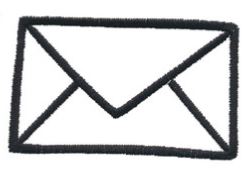How Do You Mail an Inmate in the San Saba?
San Saba Inmate Mail Guidelines

Postcards
The San Saba allows inmates to receive pre-metered postcards like the type purchased from the post office. They may also allow certain photo postcards as long as they have not been tampered with or contain images that may be considered to be obscene or violent in nature. It is best to only use blue or black ink. Always include your name and return address.
Envelopes
The San Saba also allows envelopes to be mailed to inmates. It is best to only use blue or black ink.
Postcards and envelopes MUST HAVE the sender's full name and return address on the envelope.
Postcards and envelopes MUST be mailed to the following address:
Inmate Name, Inmate TDCJ Number
Confirm Mailing Address here
Legal Mail

Send all Legal Mail to this Address:
Inmate Name, Inmate TDCJ Number
Confirm Mailing Address here
Newspapers
Newspapers may also be mailed to an inmate as long as they are shipped directly from the publisher.
Magazines
News, special interest or sports magazines may also be mailed to an inmate as long as they are shipped directly from the publisher. Any magazines that contain profanity, weapons, pornography or other content that is adult in nature will be confiscated by the jail staff and will NOT be delivered to the inmate.
Books
The San Saba allows books to be mailed directly to the jail from a reputable source such as Amazon, Barnes & Noble or Books-A-Million. You can order them directly from your computer and have them shipped to the inmate at the address noted.
Books must NOT contain images or content that are considered excessively violent, pornographic or obscene. Any book that does not meet the San Saba standards will be disposed of.
Hard cover books will not be accepted by the jail due to their potential to be used as a weapon.
All newspapers, magazines and books are to be shipped to:
Inmate Name, Inmate TDCJ Number
Confirm Mailing Address here
Texas Department of Criminal Justice Inmate Mail Instructions

- Letters sent to inmates should include the inmate’s name, TDCJ number, and unit address on the envelope.
- Unit addresses are available here. The San Saba address can be found at the top of this page.
- Letters for different inmates should not be included in the same envelope.
- Inmates are not allowed to write or eceive letters from other inmates without meeting specific criteria outlind in the “Uniform Inmate Correspondence Rules.”
- Mail is forwarded to inmates who transfer from one unit to another within the TDCJ.
- Letters will be forwarded to inmates who are released from prison, if the inmate provides a forwarding address at the last unit of assignment.
- Inmates may not write to minors whose parents disapprove, with the exception of an inmate’s own children or stepchildren (unless the child or stepchild is the inmate’s victim).
- The TDCJ prohibits unauthorized contact with a victim or a victim’s family member by inmates if the inmate is currently serving time for committing a crime against that victim; the victim was younger than 17 years of age at the time of the offense; and written authorization for the contact was not obtained prior to the initiation of the contact.
- The TDCJ also prohibits the unauthorized contact of a victim by a sex offender.
- The courts may also prohibit an inmate from contacting, during the term of confinement, the victim of the offense for which the defendant is convicted or a member of the victim’s family.
- Unauthorized materials or contraband found in mail addressed to inmates will be rejected.
- Individuals who commit serious violations of the correspondence rules may not be allowed to write to an inmate.
- Newspapers, magazines, and books may be mailed directly to inmates only by the publisher, publication supplier, bookstore, or online bookseller, subject to review and rejection in accordance with the correspondence rules.
- Inmates may receive reference books and other educational materials from volunteer organizations that operate the following types of programs: literacy and education, life skills, job skills, drug and alcohol rehabilitation, support groups, arts and crafts, and any other programs designed to aid inmates in the transition between confinement and society.
- Inmates are prohibited from maintaining active social media accounts, including Facebook, Twitter, Instagram, and similar social media, for the purposes of soliciting, updating, or engaging others, through a third party or otherwise.
- Do not assist inmates in circumventing agency policy by operating social media accounts on behalf of inmates.
- Social media accounts maintained by third parties that are about an inmate or discuss an inmate are not prohibited if they do not claim to be personally maintained by the inmate.
- Stationery is writing paper and envelopes, to include carbon paper.
- Stationery may be provided through the indigent correspondence supply program or purchased through the unit commissary by the inmate and inmate families or friends through the eCommDirect program.
- Items such as food, clothing, jewelry, toiletries, or any item other than books, magazines, and newspapers may not be mailed to inmates.
- Individuals may not mail packages to inmates.
